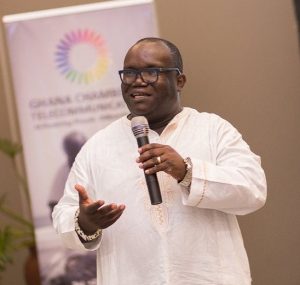[caption id="attachment_4996" align="alignnone" width="300"] Kenneth Ashigbey-CEO of Ghana Chamber of Telecommunications[/caption]
Kenneth Ashigbey-CEO of Ghana Chamber of Telecommunications[/caption]
Telecommunication companies are considering legal action against individuals, groups and companies whose activities results in fibre cuts of service providers.
This has become necessary because engagements with the National Engineering Coordinating Team to sanitize work around the right of ways and road reservation corridors have not yielded results as telecoms cables and infrastructure continues to suffer great damage.
Chief Executive Officer (CEO) of the Chamber, Ing. Kenneth Ashigbey lamented the service loss to customers, the incalculable damage to industry reputation and revenue loss to the state as well as mobile network providers.
He decried the worrying trend which he explained spikes up operational costs of the network operators, reduces last mile connectivity and rural expansion projects not-forgetting the effect on the security of the Ghanaian citizen who require uninterrupted telecommunications services.
Perpetrators of Fibre cuts
“Fibre optic cables laid with all requisite fees paid to mandated authorities continue to suffer persistent cuts from road constructions and other private development activities such as property developers, farming activities, other utility providers etc. despite engagements with the National Engineering Coordinating Team to sanitize work around the right of ways and road reservation corridors” he emphasized.
Sharp rise in Fibre cuts
Statistics compiled by the Ghana Chamber of Telecommunications shows a sharp rise in incessant fibre cuts which is responsible for poor quality of service as well as imposing huge financial burden on service providers.
Negative impact of Fibre cuts
The fibre cuts create network challenges such as call drops, speech mutation, calls not going through, poor voice signals, and degrades user service quality and experience.
This negative development also spikes up operational costs of the network operators, reduces last mile connectivity and rural expansion projects not-forgetting affecting the security of the Ghanaian citizen which requires uninterrupted telecommunications services.
Fibre cuts rise exponentially
According to data from Telcos Chamber, the number of cuts are going up exponentially.
30% rise in fibre cuts in Jan 2019
For example, the number of cuts recorded in January 2018 was 203 but this number jumped by over 30‰ in January 2019
Repairs cost $16m in 2015
The data revealed that it costs over $16 million to repair the damages in 2015.
$400,000 monthly cost of repairs in 2015
This put the monthly average cost of repairs to about $400,000 in 2015.
Repairs cost $700,000 in Jan 2019
However, the statistics revealed that in January 2019, over $700,000 was spent on repair of damages due to fibre cuts.
Repair cost almost doubled
This means that the monthly average cost of repairs has almost double in January 2019 compared to 2015 monthly average figure.
Down time worsens
The statistics also established that the average time for restoring the cuts and the down times are also increasing making the cost in terms of reputation and loss of revenue is incalculable.
Telcos key to development
Mobile telecommunications services are fundamental to the effective functioning of the State as they are critical to national security and for economic and social activities.
However, despite the clear importance of this service, and with its immense infrastructure and meshed networks built to support the deployment of the service, mobile network operators continue to suffer fibre cuts, which disrupt service quality and interrupts the network.
NCA imposes GHC34 fines on Telcos in 2019
Last month, industry regulator, the National Communications Authority (NCA) imposed fines totalling GHC34million (GHC34, 065,000) on the four telecommunication companies for poor quality of service
AirtelTigo picked up the heftiest fine of GHC11.6 million (GHC11, 635,000).
All other Telcos also received sanctions with Glo being fined GHC4.4 million (GHc4, 460,000), MTN fined GHC9 million (GHc9, 080,000) and Vodafone receiving a GHC9.8 million (GHc8, 890,000) fine.
The companies are in court challenging the fines.
NCA imposes $7m fines in 2018
In November 2018, four telecommunication firms were fined $7 million for poor services.
The fine imposed by Ghana’s National Communication Authority affects MTN AirtelTigo, Glo and Vodafone.
The regulator justified the fines on grounds of non-compliance with various quality service requirements.
Source:Chamber News Desk







